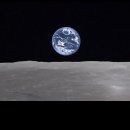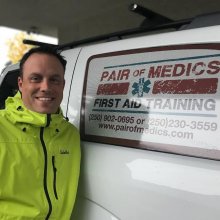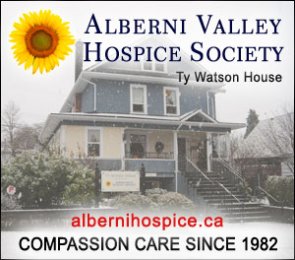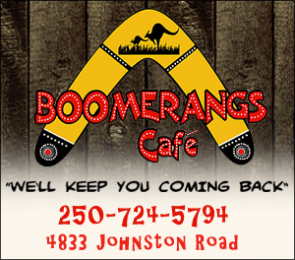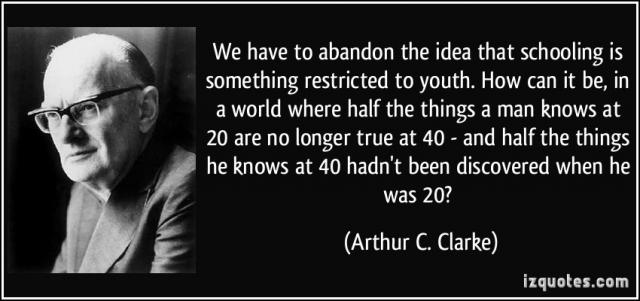
Sweltering in 30-degree bone-dry days, it seems unreal that September is so close. Yet there it is, with all the seasonal stuff it brings along: Salmon Festival, Labour Day . . . and back to school.
Time was, going back to school defined you as between ages 6 and 18 (or maybe 19 if you missed a grade). You carried a book bag, arrived on time, sat at a desk arranged in rows of desks, and listened (or not) to the teacher stationed at the front of the room. No longer.
Laptops, iPads, and electronic media are part of school life. Schools empty out for Pro Days, spring break, summer and more. Classroom layout can be inventive and creative. Teaching styles may be collaborative and mentoring rather than hectoring or merely lecturing. But however it's configured, school has one goal: to provide an optimum input of knowledge and critical thinking skills in a limited timeframe so the student can deal effectively with the future.
At its very best, "school" is about nurturing the will to learn.
Yet with an emphasis on "graduation" comes another limit: a tendency think "Well, now that's over and done." Humans are the most curious beings on Earth. How strange that we should want to stop with "graduation."
Secret? Learning and growing continue naturally through our entire lifetimes -- if we nurture them. They will die if we don't. They can extend our quality of life if we do -- studies into Alzheimer's disease have shown this. The most effective way to keep a mind alive is to use it -- vigorously, the same way a body builder trains muscles.
Graduation is only the beginning.
In our wired world, there are undiscovered countries at our fingertips at (almost) warp speed. Anything you dreamed about learning is waiting in cyberspace. Author and educator Leo Buscaglia describes how his father insisted that his children each have something new to tell him every day at dinner. The question was, "What did you learn new today?" If they came up short, Buscaglia and his sister would scramble to find something -- "even if it was just the population of Nepal." That was in the 1950's -- when the internet was science fiction. We, today, can do more.
To dip into the real world of the web, Khan Academy (an award-winning not-for-profit organization) offers "a free world-class education, for anyone, anywhere." History, art, music, economics, mathematics, sciences -- mostly interactive, with your own account to log progress. ZOONIVERSE is about the sciences -- mapping our Moon and Mars, the formation of galaxies and stars, hunting for exoplanets. In life sciences, you can learn to understand bat calls, whale songs, and monitor wildlife. Or classify plankton, piece together ancient manuscripts, catalogue 19th-century music, and more. Dear Professor Einstein lets you transcribe the actual letters sent to Einstein and the Emergency Committee of Atomic Scientists post-World War II -- primary research.
University fees? Many of Earth's finest institutes of learning now offer courses free on line. This is the galaxy of MOOCs (Massive Open Online Courses), and its stars include MIT, Harvard, Yale, University of Toronto, Australian National University, CalTech, Karolinska Institutet, Moscow State University, Open University, UBC, University of Geneva, University of Tokyo -- and hundreds more. In some cases, certificates of verification can be had for varying fees.
These are not games. They offer real learning. At the speed of today's world merely "killing time" risks a collision with our common future.
The real undiscovered country lies beyond school, beyond graduation. It's a place for us to explore at every age, as long as we live. Author Gail Sheehy was the first to research life changes in adults, showing that throughout life we continue to experience milestone changes as significant as (or more significant than) adolescence. In the words of the Carpenters song, "We've only just begun."
Paraphrasing Mr. Spock: It's school, Jim, but not as we know it.
May we all learn long, and grow . . . in our understanding of this planet we call home, and the universe it travels through.
What did you learn new today?
-- Gillian Shearwater
References:
Living, Loving and Learning, by Leo Buscaglia http://www.buscaglia.com/books.aspx#80542
Carpenters, We've Only Just Begun https://www.youtube.com/watch?v=__VQX2Xn7tI
"Dear Professor Einstein" : correspondence of The Emergency Committee of Atomic Scientists (a project of Oregon State University)
http://scarc.library.oregonstate.edu/omeka/exhibits/show/ecas/about
Exercising the Body, Using the Brain (AARP Bulletin)
http://www.aarp.org/health/brain-health/info-02-2012/exercising-may-prevent-alzheimers-health-discovery.html
Khan Academy https://www.khanacademy.org/
Mental Activity and Alzheimer's (WebMD article)
http://www.webmd.com/alzheimers/news/20030618/alzheimers-mental-activity
MOOCs (Massive Open Online Courses) https://www.mooc-list.com/
Passages, by Gail Sheehy http://psyclassics.com/book/sheehy-passages
http://gailsheehy.com/
ZOONIVERSE https://www.zooniverse.org/#/
DISCLAIMER: Alberni Deep Space Port Star Trek Fan Association is a registered BC non-profit society, affiliated with STARFLEET, the International Star Trek Fan Association, Inc. -- itself a registered not-for-profit based in the United States. Use of trademarked terms is under "fair use" only, as permitted by law. No infringement is implied or intended. This message and this organization are both not-for-profit.
TO CONTACT: Tel. 250-724-7293, or email AlberniDeepSpace (at) gmail (dot) com

